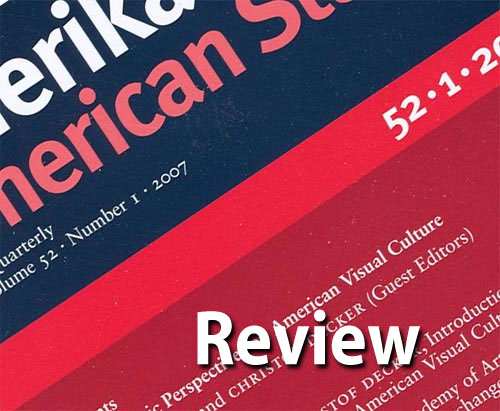Jennifer Clark, The American Idea of England, 1776-1840: Transatlantic Writing (Aldershot: Ashgate, 2013), 232 pp.
Amerikastudien/American Studies 60.2/3
In just a few words, Jennifer Clark succinctly expresses the guiding assumption of her monograph claiming that “[i]f the lines between American and English culture were blurred, the political differences were sharp and always in focus” (157). Read the other way around, i.e. that following political independence, cultural allegiances between the United States and England remained in focus, this sentence encapsulates the central concern of much recent research in the burgeoning field of transatlantic literary studies. Numerous monographs and essay collections have, over the last ten years or so, revisited the literary and cultural connections between colonial America and the United States, respectively, and Great Britain (Clark, tellingly, focuses on England only). Perforating American literary history by contesting the notion of exceptionalism that has steered the direction of American studies for a long time, these scholars have reexamined periods, authors, genres, reception processes, media and book history as well as mentalities and cultural sensitivities by virtue of their transatlantic investments. As Clark points out elsewhere in her book, transatlantic studies seek to leave behind binary models of conceptualizing the relationship between the two nations, providing a more “accommodating and multi-dimensional framework” (16) for the many, yet relatively unexplored, phenomena that are subsumed by the category transatlantic relations.
Clark responds to this call for multi-dimensionality and complexity in the six main chapters that her monograph comprises (in addition to the Introduction and Conclusion), covering a refreshing and innovative combination of textual genres and discourses. These chapters are meant to put into relief different platforms that US-American writers used to envisage England after the Revolution, thereby honing the American self-image. Clark’s argument is that “[…] post-revolutionary American society was significantly concerned with the intellectual condition of no longer being formally connected to Great Britain, that this was important and engrossing, and that the process was seen as a nationalistic concern. American culture should be interpreted as a product of transatlantic interaction rather than conflict”(15).
In chapter one, Clark traces the precarious and changing significance of Anglophilia within US-American political discourse after the Revolution. Once praised as signs of erudition and taste, the (rhetorical) appreciation of English things—ranging from furniture to the monarchy—could now come across as pro-English leaning and thus a destabilizing factor. This affected early political writing in the United States where certain expressions acquired a threatening edge. Chapter two looks at the allegorical representation of John Bull, the “earthy persona for the English nation” (57), as a prime example of the “[…] direct and unequivocal literary mimicry, ideological borrowing and symbolic replication” (60) that shaped transatlantic relations at the time. Looking at the John Bull allegories provided by Francis Hopkinson, James Kirke Paulding, and Jeremy Belknap, Clark demonstrates how allegorical appropriations of this figure served as a means of expressing discontent with English politics. Chapter three examines the War of 1812 as a “[…] magnifying glass through which social and political issues in the new nation were given clearer focus” (79). Of central importance in this chapter is the rhetoric used by supporters of the French and the English in the US Senate. In chapter four, Clark turns to the raging Paper War in British and American periodicals in the early nineteenth century, showing how American writers and commentators learned to build their defenses against the journalistic attacks launched by British writers, which piqued the confidence of many American writers and intellectuals for decades to come. Chapter five dwells on travel writing as the “one distinct body of writing that describes the American in physical contact with England” (137). In other words, travel writing (examples discussed are N. H. Carter’s Letters from Europe and James Fenimore Cooper’s Gleanings in Europe), no matter how predictable and formulaic its narratives were, brought readers closest to the American experience of England. Inevitably working towards comparisons with their own country and identity, these writers and correspondents coined modes of expressing an American identity that informed works by the big American authors Herbert Melville and Mark Twain later in the nineteenth century. Finally, in the sixth chapter, Clark browses through a number of fictionalized travel accounts of England (e.g. Washington Irving’s The Sketch-Book of Geoffrey Crayon, Gent. and Royall Tyler’s The Yankee in London) to show how the idea of England blossomed in the American literary imagination.
The book’s greatest strength is the variety of materials it considers: each chapter opens up a new world of discourse and writing, and while each chapter is self-contained, there are many relevant correspondences between texts belonging to different categories and genres. Another outstanding feature is the author’s disciplined and beautifully poised presence in her writing, which makes her perambulation through a potentially rocky territory of heterogeneous texts and voices smooth and easy to follow for the reader. However, the broad conclusions which Jennifer Clark draws, that e.g. “[…] America could not deny her English past but, instead, struggled to integrate the traditions and culture of that past with the demands of the guiding faith of the revolutionary generation […]” (195) do not essentially add to what is generally well-established about this period in American and British cultural and literary history. Hence, Clark’s study is a persuasive and, due to its circumspect and original work on the textual archive, valuable piece of scholarship that enriches transatlantic studies, while not necessarily sharpening the debates.
Bern, Julia Straub


